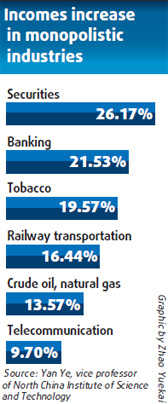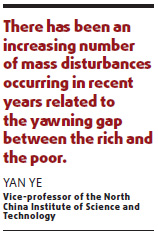Society
Wealth gap poses threat to stability
By Chen Jia (China Daily)
Updated: 2010-01-09 08:46
 |
Large Medium Small |
China's widening wealth and income gap is posing a serious threat to its social stability, senior Chinese sociologists warned on Friday.
| ||||
The latest warnings are based on research of six cases of mass disturbances that broke out in 2008, including the Weng'an incident in Guizhou province, the Sanlu tainted milk scandal and taxi drivers' strike in Chongqing municipality.
Unbalanced income among different sectors of the economy topped the reasons behind the threat to the country's social stability, according to Yan's research report in the book titled Social Structure of Contemporary China, released by the Social Sciences Academic Press on Friday.
 The government should strengthen supervision to control "a number of senior managers' high incomes in monopolistic industries", Yan said.
The government should strengthen supervision to control "a number of senior managers' high incomes in monopolistic industries", Yan said.
The huge gap between the urban and rural regions could also cause an increasing number of migrant workers to desire living in the cities rather than the countryside, the report showed.
"About 55 percent of the Chinese population live in rural areas, but they share just 11.3 percent of society's wealth," Yan said.
Based on international standards, the minimum wage should be 40 to 60 percent of the average monthly wage, the report said.
Government policies to increase minimum wage standards have also slowed amid lessening pressure on enterprises since the economic crisis in 2008, it said.
As such, government, enterprises and employees should discuss the minimum wage standard, Lu Xueyi of the Chinese Academy of Social Sciences, said on Friday.

"Governmental supervision can influence State-owned enterprises' policies on protecting employees, but there is no similar supervision mechanism for the increasing number of private enterprises in China," he told China Daily.
"The government needs to, on the one hand, ensure the functioning of market economy, and to promote a just and harmonious society on the other," he said.
The Ministry of Labor and Social Security set China's first regulation on minimum wage on March 1, 2004.
The Regulations on Enterprises' Minimum Wage was made to "ensure the basic needs of workers and their families, to help improve workers' performance and to promote fair competition among enterprises".
One monthly minimum wage was set for full-time workers, and one hourly minimum wage for part-time workers. Provinces, municipalities, and autonomous regions are also allowed to set their own minimum wages that are separate from the national standard.











